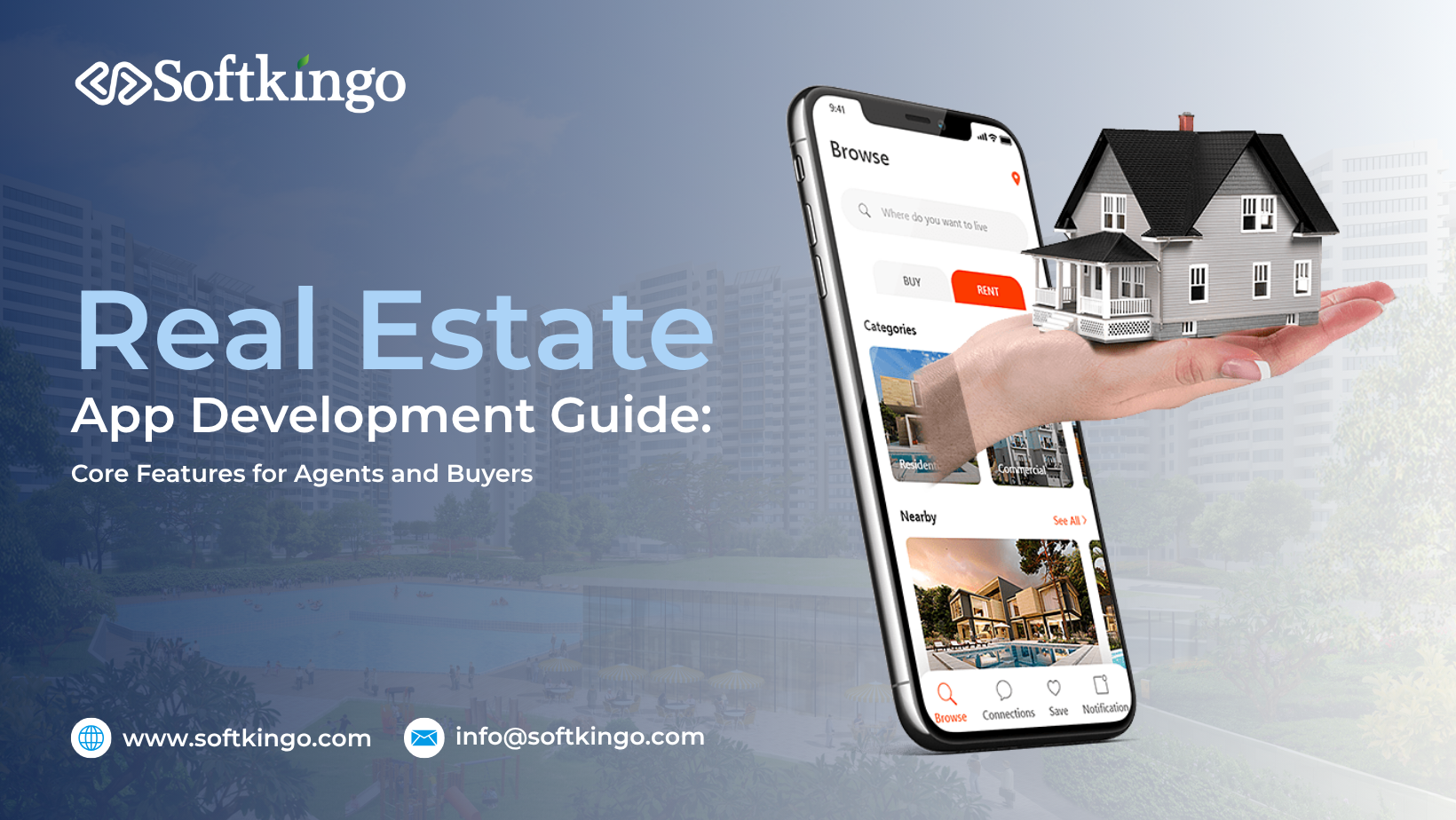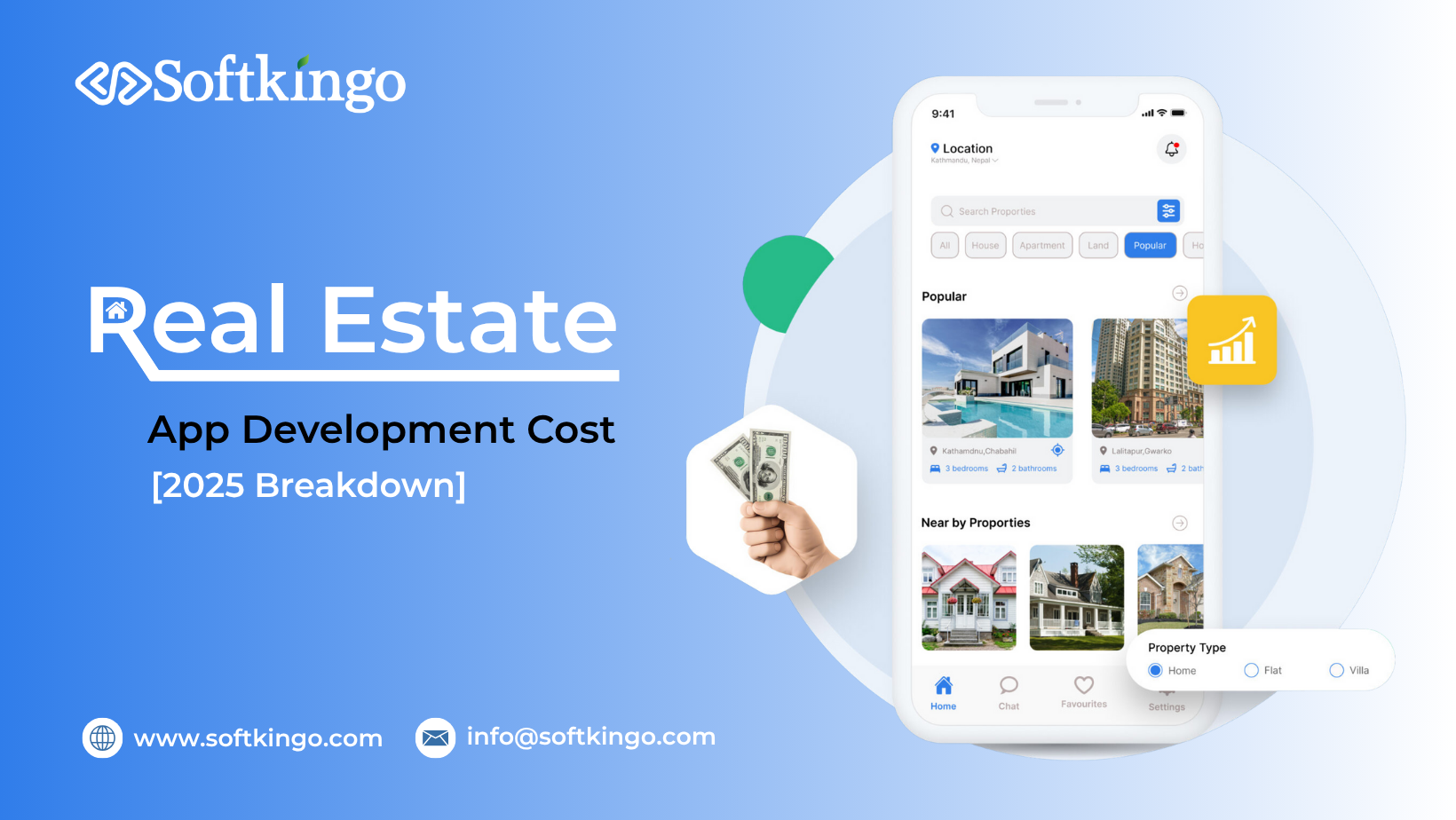Real Estate App Development Guide: Core Features for Agents and Buyers
If you still believe in yard signs and newspapers for advertising real estate, then you must know that 70% of the population in the US has already adopted digital means to buying and selling property.
Buyers and agents equally expect the fast, intuitive, and safe solution digitally. Custom real estate app development in tech-forward cities like Dallas, Texas, New York, etc., is not gorgeous but necessary. Partnering with an experienced real estate app development firm helps to develop high-performance mobile applications that stand at least to your expectations and often beyond.
Did you know? The US real estate market is projected to value approximately US$136.62tn by 2025 and forecasted to grow at a CAGR of 3.31% during 2025-2029, which means by 2029 real estate market will have an estimated market volume of US$155.60tn. (Source)
Why Every Real Estate Business in US Needs a Mobile App in 2025?
Studies say almost 97% of home buyers use the internet for property search,-little less than half of those use smartphones for this purpose. In a tech-savvy region like the USA, users expect to just take out their smartphone to access listings, go through virtual tours, and connect with an agent. Therefore, mobile apps serve as one:
(1) Speed: View, inquire, and close within few clicks.
(2) Convenience: Buyers and agents utilize the same platform to connect, communicate, and close deals. The clients in the U.S. love to stay connected on the go-whether they're at work or searching for home during the weekend.
(3) Personalization: Mobile apps track user preferences and notify them instantly about suitable deals.
(4) Competitive Edge: The presence of digital apps makes welding the cutting edge of the real estate business, and it sets your brand apart from traditional competitors who are stuck purely on the web or relying on email.
Mobile applications will not be complimentary real estate businesses anymore in 2025; they will be essential for visibility, swift conversion, and brand credence.
What Are the Must-Have Real Estate App Features in 2025?
Real estate apps in 2025 do much more than display property listings—they serve as end-to-end solutions for buyers, renters, and agents. The right features not only enhance user experience but also drive real results in a competitive market.
Here’s a breakdown of the core features every real estate app should include, tailored to both consumers and agents.
(1) Key Features for Buyers and Renters
1.1 Smooth User Onboarding (Signup/Login)
A fast, frictionless signup process using email, phone number, or social logins is the new standard. Enhance trust and security by supporting biometric authentication like Face ID or fingerprint recognition. First impressions matter—especially in real estate.
1.2 Intelligent Property Search
Searching should be effortless but powerful. Users expect granular filters: price, neighborhood, square footage, property type, amenities, and more. Smart search tools that learn from behavior and suggest relevant listings are a huge bonus—like getting a tailored experience every time they log in.
1.3 Map-First Browsing Experience
In cities like NYC, Dallas, or Austin, location is everything. A map-centric interface enables users to explore neighborhoods visually, evaluate proximity to schools, hospitals, parks, and public transport—all within the app. It turns research into a real-time, interactive experience.
1.4 Saved Searches & Instant Alerts
Let users favorite listings and set custom alerts for price drops, new matches, or open house announcements. Real-time push notifications help them move quickly on hot listings before someone else does.
1.5 Built-in Mortgage and Affordability Tools
In-app calculators that handle loan estimations, mortgage breakdowns, and comparisons allow users to assess affordability instantly—helping them make confident, informed decisions without needing external tools.
1.6 Mobile-First Performance
Speed is essential. Buyers won’t wait around for a laggy app. Ensure the app loads in under 2 seconds and runs smoothly on all devices. A seamless mobile experience can be the difference between keeping a user or losing a lead.
1.7 Investment Insights & ROI Calculators
With real estate emerging as a preferred investment in cities like NYC, Dallas, and Houston, provide tools like rental yield calculators, ROI projections, and cap rate estimators to attract investor-minded users.
1.8 Interactive & Data-Rich Maps
Beyond standard maps, integrate heatmaps highlighting lifestyle data—proximity to nightlife, schools, green spaces, walkability, etc. Buyers want to know more than just square footage; they want to understand the quality of life a neighborhood offers.
1.9 Seamless Communication Tools
Offer in-app messaging, chat, or call options so users can reach out to agents or landlords without leaving the app. Keeping communication in one place ensures efficiency and builds trust.
1.10 Virtual Tours and Video Walkthroughs
Visuals are powerful. Let users explore properties through 360° virtual tours, drone shots, and guided video walkthroughs. These immersive experiences often serve as a deciding factor before scheduling an in-person visit.
(2) Key Features for Real Estate Agents
2.1 Easy Listing Management
Agents need robust tools to create, update, and manage listings with ease. Support bulk uploads, media galleries, and smart tagging. A smooth backend ensures agents can focus on what matters—closing deals, not fixing glitches.
2.2 Personalized Agent Profiles
Professional, humanized profiles build credibility. Let agents showcase bios, experience, client testimonials, and active listings. This helps users connect with agents they trust—boosting conversions and brand loyalty.
2.3 Smart Lead Dashboard
A real-time dashboard that tracks inquiries, saved listings, messages, and scheduled meetings helps agents manage leads efficiently. Knowing who’s engaging with listings—and how—makes following up timely and relevant.
2.4 Real-Time Notifications
Agents should receive push alerts when new leads come in, when someone schedules a showing, or when messages are received. Fast responses increase engagement and close rates—turning interest into action.
What Are Real Estate App Features?
The above includes must-have features for any real estate app in the USA. However, these below defined features will often weigh an app down, confuse the users, or simply fail to provide a good ROI in 2025.
1. Chatbots with No Human Support
One of the most common uses of chatbots is to provide 24/7 support. Many real estate apps today have them just as placeholders, instead of actually resolving user queries. If a bot cannot answer even simple questions or send a user's query to the right person, then it just leads to frustration and dropout.
2. Overdesigned 3Ds and ARs
While 3D walkthroughs and AR furniture may seem impressive, on the downside, given their heavy sizes, they cause mobiles to glitch. Softkingo is the leading real estate app development company that assists you in the proper implementation so these glitches don't harm the user experience.
3. Too Many Filters
Too many filters may confuse the user. Buyers want to get relevant results fast and do not want to select maybe up to 30 checkboxes before starting a search. To this, keep only important filtering options, which would include location, price range, and property type.
4. Custom Neighborhood Scores without Proofs
Creating your own neighborhood scoring system is fine, but it can be misleading if not cross-verified with trusted data sources. It will confuse the users or give false data.
The point is, don’t be swayed by features that just look shiny from a distance! You should partner with Mobile app development Dallas to get custom suggestions and development of your real estate app.
How Much Does it Cost to Develop A Real Estate App?
Well, the cost of developing a real estate app in 2025 is clearly depends on,
- Platform (iOS, Android, or both)
- Feature complexity
- UI/UX design needs
- Backend development & third-party integrations
- Location of your app development team
The following table shows the approx. breakdown of the cost:
| App Type | Estimated cost (USD) |
|---|---|
| Basic MVP App | $20,000 – $40,000 |
| Mid-Level App | $40,000 – $80,000 |
| Feature-Rich Custom App | $80,000 – $150,000+ |
Cost can vary based on whom you hire as the experienced team. Because it is an establishment of good repute in real estate app development in America, Softkingo carries with it a balance of quality, local know-how, and cost efficiencies accrued from its years of operation in local markets in Dallas, New York, and Texas.
How to Choose the Special Real Estate App Development Services
When choosing your mobile app developer partner, use the below checklist:
- Local experience in US real estate market
- UI/UX skills custom for American mobile users
- Priority given to user data protection
- Scalable for future growth
- Support after launch
Softkingo has enough knowledge in both app development and the real estate market. We do custom app development, have massively capable support systems, and offer post-launch support 24/7. Our team develops applications that are intuitive and fast enough to meet the needs of the tech-savvy American market.
Who Is Most Successful Real Estate App Development Company in Dallas, USA?
If you're located somewhere in Dallas or anywhere across the US and are looking for a reliable tech partner, Softkingo stands among one of the most experienced real estate app development companies in the US.
When it comes to choosing a partner for your mobile app development, consider Softkingo for:
- Presence across the USA
- Strong knowledge of US real estate tech trends
- Established experience in real estate and location-based apps
- Transparent project management with on-time delivery
- Quality, security, and best user experience consciousness
Be it launching a buyer-focused tool or an enterprise platform for agents; Softkingo builds scalable, tailor-made mobile app solutions that simply work.
Now the time is the right time to transform your ideas into digital reality
In the US real estate market of 2025, everything is going in a very lucrative way. As mentioned earlier, folks have switched almost completely to digital apps for their property requirements. Having the right app can build your brand and attract and retain buyers, lead conversions, and provide agents with the tools to get their jobs done smarter. Focusing on features that truly matter while letting tawdry distractions take a backseat will help you deliver UX, deeper relationships, and the ultimate status as the competition.
Remember, if you choose the right real estate app development company, they will be a real factor in your app idea turning into success or failure. Do choose carefully!
The partnership with your best mobile app developers in Dallas will help you get a customized concept in the development of mobile apps for the US real estate market.
Contact us for project discussions and step one toward building a winning real estate app.
FAQs
(1) What are the deciding factors on real estate app features to be implemented in MVP?
What is the goal for a user with their first visit? Probably searching for a property, contacting, and looking at pictures. So these are the basics of any good MVP in a real estate app
(2) What’s the best way to organize real estate features for buyers and agents?
Segment features by user type don’t show agent dashboards to buyers. Clean roles lead to cleaner UX.
(3) How do real estate apps make money?
You shall add various revenue models like subscription model, freemium model, etc to earn money from the real estate apps.
Was this article helpful?
Current mood: Okay
Written by Ansh Raj Singh



